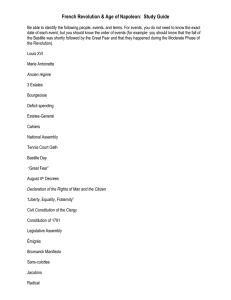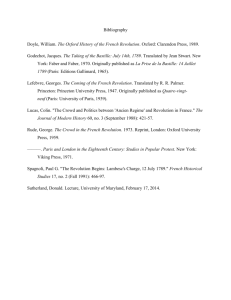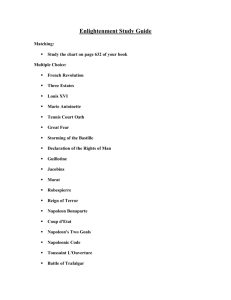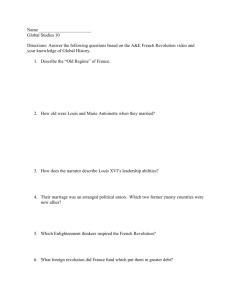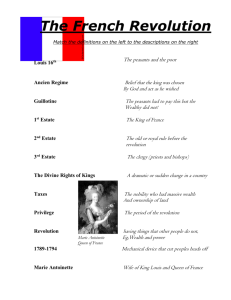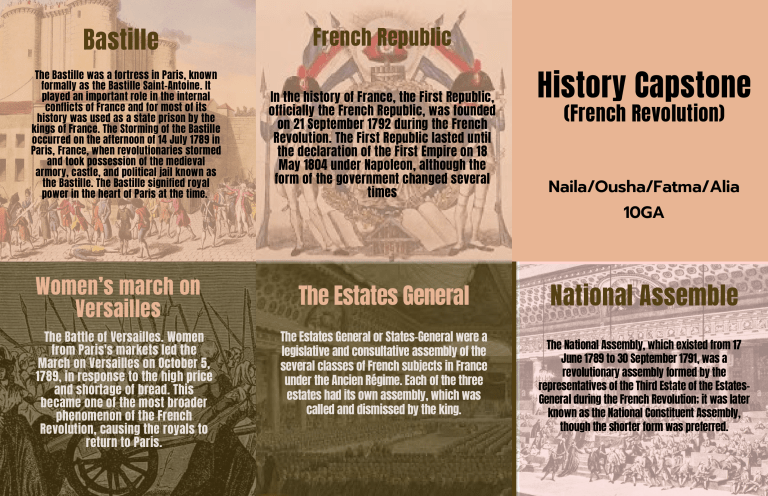
Bastille The Bastille was a fortress in Paris, known formally as the Bastille Saint-Antoine. It played an important role in the internal conflicts of France and for most of its history was used as a state prison by the kings of France. The Storming of the Bastille occurred on the afternoon of 14 July 1789 in Paris, France, when revolutionaries stormed and took possession of the medieval armory, castle, and political jail known as the Bastille. The Bastille signified royal power in the heart of Paris at the time. Women’s march on Versailles The Battle of Versailles. Women from Paris's markets led the March on Versailles on October 5, 1789, in response to the high price and shortage of bread. This became one of the most broader phenomenon of the French Revolution, causing the royals to return to Paris. French Republic In the history of France, the First Republic, officially the French Republic, was founded on 21 September 1792 during the French Revolution. The First Republic lasted until the declaration of the First Empire on 18 May 1804 under Napoleon, although the form of the government changed several times The Estates General The Estates General or States-General were a legislative and consultative assembly of the several classes of French subjects in France under the Ancien Régime. Each of the three estates had its own assembly, which was called and dismissed by the king. History Capstone (French Revolution) Naila/Ousha/Fatma/Alia 10GA National Assemble The National Assembly, which existed from 17 June 1789 to 30 September 1791, was a revolutionary assembly formed by the representatives of the Third Estate of the EstatesGeneral during the French Revolution; it was later known as the National Constituent Assembly, though the shorter form was preferred. Louis XVI was the last King of France before the fall of the monarchy during the French Revolution. He was referred to as Citizen Louis Capet during the four months just before he was executed by guillotine. In 1765, upon the death of his father, Louis, Dauphin of France, he became the new Dauphin. Napeleons fall Two years later, in the aftermath of a disastrous French invasion of Russia in 1812, Napoleon abdicated the throne and was exiled to the island of Elba. After a devastating defeat at Waterloo, he abdicated once more and was imprisoned on the remote island of Saint Helena, where he died at the age of 51. The Congress of Vienna was a meeting in 1814–15 that helped rebuild Europe after the Napoleonic Wars. It began in September 1814, five months after Napoleon I's abdication, and concluded in June 1815, just before the Waterloo campaign and Napoleon's final defeat. The deal was the most comprehensive treaty ever seen in Europe. Napoleon’s rise Marie Antoinette Napoleon, who was born on the island of Corsica, moved quickly through the ranks of the French military during the French Revolution (1789-1799). He declared himself Emperor in 1804 after gaining political power in France in a coup in 1799. Marie Antoinette was the last queen of France before the French Revolution. She was born an archduchess of Austria and was the penultimate child and youngest daughter of Empress Maria Theresa and Emperor Francis I. Born in Vienna, Austria, in 1755, Marie Antoinette married the future French king Louis XVI when she was just 15 years old. ... In 1793, the king was executed; then, Marie Antoinette was arrested and tried for trumped-up crimes against the French republic. She was convicted and sent to the guillotine on October 16, 1793. Guillotine A machine used during (and after) the French Revolution for beheading people condemned to death, by means of a heavy sharp blade that slid down within vertical guides. By extension, "guillotine" refers to any shearing machine or instrument (such as a paper cutter, a book trimmer, etc.) The War with Europe They are divided in two periods: the War of the First Coalition (1792–97) and the War of the Second Coalition (1798–1802). Initially restricted to Europe, the battle increasingly attained a global dimension. .The triumph of the French in these battles secured the spread of revolutionary concepts over much of Europe.
